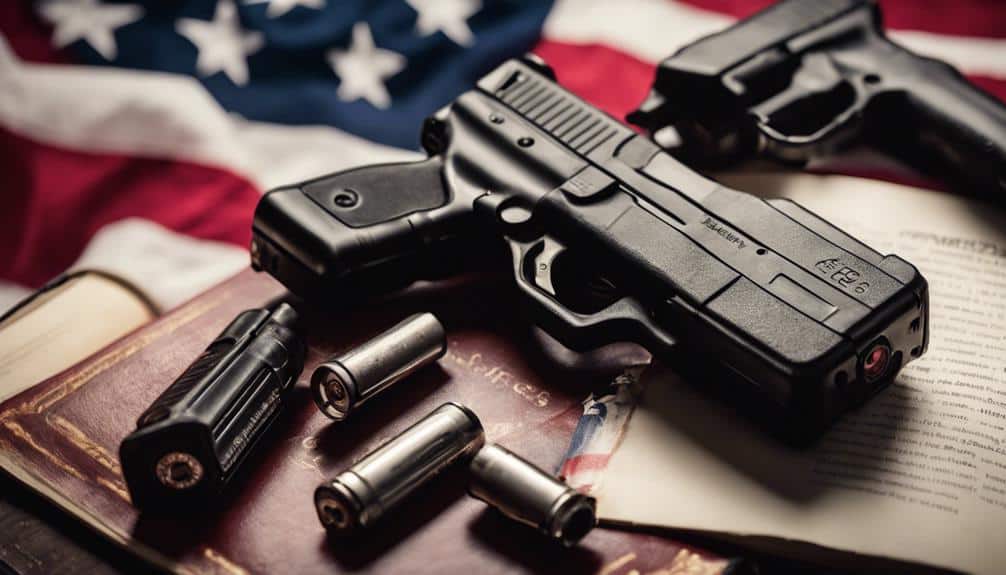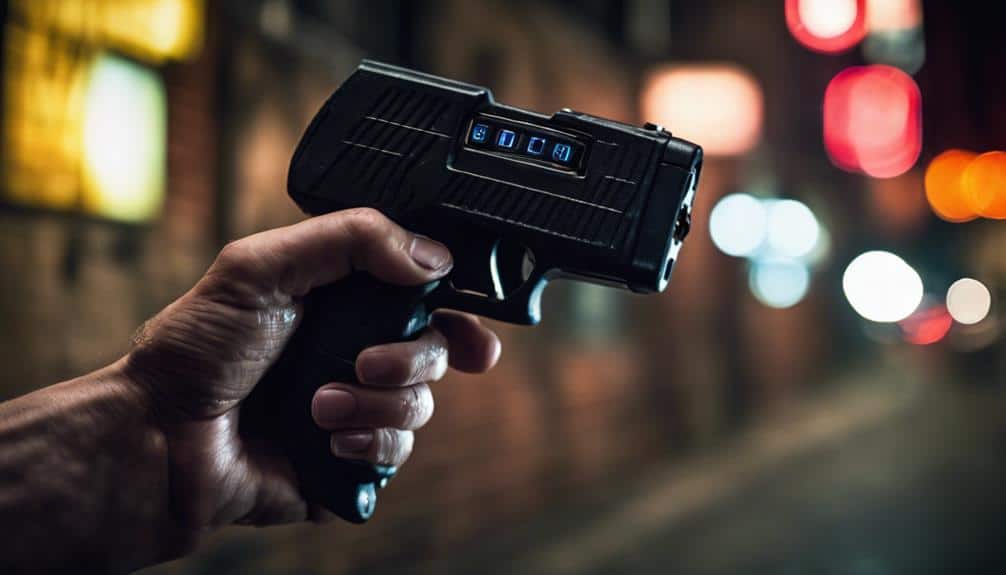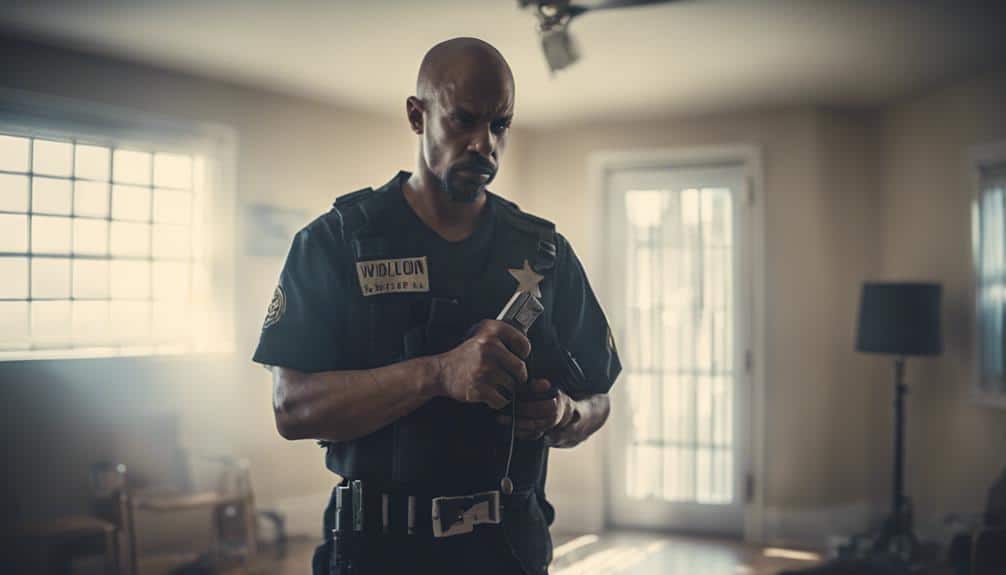You’re probably wondering if
felons in America can
legally own stun guns for self-defense. It’s a
mixed bag; it largely depends on the state. While federal law bans felons from owning firearms, stun guns are in a gray area. States like Texas may allow
stun guns with little fuss, but states like New York often impose significant restrictions. So,
check your local laws closely. Advocacy and legal groups are pushing for clearer rules, promoting safer communities. Research your state’s regulations thoroughly, as knowing the law guarantees you stay on the right side of it and stay protected. Intrigued? There’s more to explore!
Significance of Self-Defense for Felons
Given their past associations and criminal history, felons often face
heightened risks of victimization, making
self-defense an essential consideration for their
personal safety. You understand the importance of protecting yourself and your loved ones, especially when your past might make you a target. Knowing
local laws is significant, as even well-intentioned actions can lead to legal trouble.
Self-defense options like
pepper spray can be a game-changer. It’s a
non-lethal way to fend off attackers, giving you the chance to escape and seek help. Imagine this: you’re walking home at night, and someone starts following you. With
pepper spray in hand, you’re prepared to defend yourself without crossing
legal boundaries.
Navigating the maze of local laws can feel overwhelming, but it’s necessary. Some areas have specific regulations about carrying pepper spray, so make sure you’re compliant. Remember, the goal is to enhance your safety, not complicate your life with legal issues.
Ultimately, prioritizing self-defense empowers you to live with confidence, ensuring
peace of mind for you and your family. Stay informed, stay prepared, and embrace the tools available to protect yourself within the bounds of the law.
Federal and State Legal Landscape
You’re probably wondering how felons’
self-defense rights intersect with the maze of
federal and state laws, right?
Well, the
legal landscape is a patchwork quilt of regulations, where states have wildly different rules about whether felons can own stun guns.
Imagine trying to navigate that complexity—it’s like playing a game of legal hopscotch, where each state has its own square, and missing a jump could land you in hot water!
Felons’ Self-Defense Rights
Understanding the patchwork of federal and state laws surrounding felons’ rights to possess stun guns is essential for any felon considering non-lethal self-defense options. While federal law generally prohibits you from owning firearms, the rules for stun guns aren’t as clear-cut. Depending on where you live, the regulations can range from fairly lenient to downright restrictive.
To give you a clearer picture, let’s break it down:
- Explicit Permission: Some states explicitly allow felons to own stun guns for self-defense, acknowledging your right to protect yourself.
- Restrictions and Bans: Other states impose restrictions or outright bans, meaning you could face legal trouble for possessing one.
- Restoration Through Expungement: Legal processes like expungement can restore certain rights, possibly including the right to own a stun gun, depending on your state’s laws.
It’s vital to research your specific state’s laws to avoid any nasty surprises. For instance, in some jurisdictions, you might still need to pass a background check to purchase a stun gun.
This means understanding local regulations isn’t just a suggestion—it’s a necessity. So, before you add that stun gun to your shopping cart, make sure you’re legally in the clear!
State Law Variability
Maneuvering the maze of
state laws is vital to understanding whether you, as a felon, can legally possess a
stun gun for
self-defense. State specific regulations vary widely, so it’s important to check your local statutes before making any decisions. Some states, recognizing stun guns as non-lethal weapons, may allow felons to possess them, while others impose strict bans.
For example,
felon eligibility criteria in states like Texas might permit stun gun ownership with fewer restrictions, whereas places like New York have tighter controls, often requiring
permits or licenses. These permits sometimes demand
background checks, which can complicate matters for felons. Imagine standing in line at the DMV but with way higher stakes!
Then there’s the issue of stun gun classifications. Some states might differentiate between a basic stun gun and a more advanced taser, with varying laws for each.
Legal interpretations and enforcement can also fluctuate, so keeping up with any changes is like watching a soap opera—with less drama and more legal jargon.
Ultimately, the key is to be vigilant. Regularly consulting state-specific regulations guarantees you stay on the right side of the law while protecting yourself.
Felon Firearm Prohibitions
Federal law generally prohibits felons from owning firearms, but the rules for non-lethal weapons like stun guns can vary widely by state. When it comes to felon rights and firearm restrictions, the landscape is a patchwork of regulations that can leave you scratching your head. Legal advocacy groups are continually pushing for clarity and reform, but here’s what you need to know right now:
- State-Specific Laws: Some states, like Indiana, allow felons to own stun guns without much fuss, while others, like New York, impose strict regulations or outright bans.
- Permit Requirements: In states like Michigan, you might need a permit to possess a stun gun, even if you’re a felon. Make sure you check your local laws to avoid any surprises.
- Legal Challenges: The legal system is constantly evolving, and court decisions can sometimes change the rules overnight. Staying informed is essential.
Navigating the maze of firearm restrictions and non-lethal weapon laws can be intimidating, but understanding your rights and the intricacies of state laws will guarantee you’re prepared.
Expungement and Rights Restoration
Expungement offers a pathway for felons to potentially restore some of their rights, including the ability to possess certain weapons, depending on state laws and the nature of their conviction. The expungement process varies by state, but generally, it involves applying for expungement after a set time has passed since your conviction. Successful expungement typically requires demonstrating rehabilitation, such as holding steady employment or completing educational programs.
| State |
Eligibility Period |
Rehabilitation Examples |
Rights Restored |
| California |
5 years |
Steady job, volunteer work |
Limited weapon rights |
| Texas |
3 years |
Educational programs, good conduct |
Some weapons, no firearms |
| Florida |
7 years |
Character references |
Limited weapon rights |
| New York |
Varies |
Community service |
Case-by-case basis |
Court hearings often play an essential role in the expungement process, where you might present character references and other evidence of good conduct. In states where expungement allows for rights restoration, you might still face restrictions on certain weapons, especially firearms. Understanding local laws is significant here. Advocacy groups can be incredibly helpful, offering guidance and legal assistance to navigate this complex landscape. So, if you think expungement might be your golden ticket to rights restoration, it’s worth diving into state-specific details and reaching out for support. After all, everyone deserves a second chance, right?
Weapon Selection Criteria
When choosing a stun gun for self-defense, it’s crucial to first research and understand your state’s legal restrictions. This will save you a lot of headaches and keep you on the right side of the law.
Once you’ve navigated the legal landscape, focus on these three key criteria:
- Stun gun effectiveness: Select a reputable brand known for quality and performance. You want a device that’s reliable and capable of incapacitating an assailant quickly.
- Personal safety and comfort: Make sure the stun gun is manageable and easy to operate under stress. Consider factors like weight, size, and design, so it fits seamlessly into your lifestyle.
- Legal implications: Keep in mind that even if a stun gun is legal in your state, there may be specific regulations on where and how you can carry it.
A good example is the Taser Pulse+, which balances effectiveness and ease of use, guaranteeing personal safety without compromising compliance.
Stun Guns: Legal Status
Let’s break down the
legal status of stun guns for felons, starting with an overview of
federal regulations, which generally don’t classify stun guns as firearms, giving them a unique standing.
However,
state laws vary widely—some states welcome stun guns with open arms, while others enforce strict bans or regulations that could leave you scratching your head.
Compliance is vital; failing to adhere to local laws can lead to hefty penalties, so do your homework and check your state’s specific requirements to avoid any shocking surprises.
Federal Regulations Overview
Federal law doesn’t specifically ban felons from possessing stun guns, but state laws can vary widely and must be consulted. Understanding the federal jurisdiction nuances is essential. At the federal level, stun guns fall under the category of non-lethal weapons, making their legal ownership implications less stringent compared to firearms. However, don’t get too comfortable—stun gun classifications can still present some legal hurdles.
So, what does this mean for you? Basically, you need to take a close look at your state’s regulations because:
- Some states require permits or background checks for stun gun ownership.
- Certain jurisdictions may classify stun guns similarly to other personal defense tools, like pepper spray.
- In a few states, specific laws allow the use of stun guns for self-defense, providing a legal avenue for felons to protect themselves.
Imagine you’ve just moved to a new state and you’re enthusiastic to get a stun gun for self-defense. It’s not as simple as walking into a store and making a purchase. You’ve got to navigate this patchwork of laws to guarantee you’re compliant. Skipping this step could mean serious legal repercussions.
State Law Variability
Maneuvering through state laws on stun gun ownership can feel like a maze, especially for felons seeking clarity on their legal standing. The legal interpretations of stun gun possession vary widely across the United States, making it vital for you to understand the state restrictions where you live. For instance, in California and New York, felons are generally prohibited from owning stun guns, while in Texas, you can own one without any restrictions.
Many states require permits or background checks, which can be a significant barrier for felons due to their criminal history. Advocacy efforts are ongoing to ease these restrictions, highlighting the broader debate about the rights of felons to possess self-defense tools. Understanding the local regulations is essential, as some jurisdictions have specific laws about using stun guns in self-defense situations.
Here’s a handy table to give you a snapshot of how different states handle stun gun ownership for felons:
| State |
Ownership Status |
Requirements |
| California |
Prohibited |
N/A |
| New York |
Prohibited |
N/A |
| Texas |
Permitted |
No restrictions |
| Florida |
Permitted with Permit |
Requires background check |
| Illinois |
Prohibited |
N/A |
Navigating these laws can be complex, but staying informed will help you avoid legal pitfalls.
Compliance and Penalties
Frequently, understanding the compliance and penalties associated with stun gun ownership is vital for felons to avoid severe legal consequences.
Maneuvering through the maze of legal requirements can be tricky, but it’s essential to stay informed and compliant to prevent hefty fines or imprisonment.
To help you grasp the essentials, consider these key points:
- Local Regulations: Research whether your state classifies stun guns as firearms. Some states allow felons to own stun guns, while others impose strict restrictions or outright bans.
- Ownership Requirements: In several jurisdictions, you may need to pass background checks or obtain permits to legally own a stun gun. Skipping these steps can land you in hot water.
- Compliance Strategies: Stay updated on your state’s stun gun laws and consider legal processes like expungement to possibly regain your rights. Always double-check with local authorities to verify you’re on the right side of the law.
Ignoring these factors can lead to serious legal consequences.
For instance, violating stun gun laws in some states could result in penalties that are no laughing matter, including steep fines or even jail time.
Non-Lethal Weapon Options
When considering
non-lethal weapon options,
stun guns stand out as a practical choice for
self-defense, especially for those restricted from owning firearms.
You might be wondering about stun gun effectiveness, and you’re right to do so. These handy devices deliver a
powerful electric shock that can
incapacitate an attacker temporarily, giving you precious seconds to escape or call for help. It’s a solid self-defense strategy that doesn’t involve lethal force, making it a top contender among non-lethal alternatives.
Imagine this: you’re walking home late at night, and someone threatening approaches. With a stun gun, you can quickly and easily disable the attacker without the dire consequences associated with firearms. Plus, the
compact design means it can fit right in your pocket or purse, ready for rapid deployment when you need it most.
However, before you rush out to get one, remember that the legality of stun guns varies by state. So, it’s essential to
check your local laws, especially if you have a felony conviction. In many places, stun guns don’t require a background check or permit, making them a viable option for those with restricted gun ownership.
Self-Defense Training Benefits
Self-defense training isn’t just about learning how to throw a punch; it’s about equipping you with essential skills to assess threats and react effectively when it counts.
By improving your
situational awareness, these programs help you spot
potential dangers before they escalate, making you a less tempting target.
Plus, who wouldn’t feel more confident knowing they’ve got some nifty moves up their sleeve, ready to keep them safe in a pinch?
Essential Self-Defense Skills
In high-stress situations, self-defense training equips you with the skills to assess threats and respond effectively, boosting your personal safety and confidence.
Mastering self-defense psychology helps you stay calm and focused under pressure, while physical fitness guarantees you’re capable of executing defensive maneuvers efficiently. Plus, community support from training groups fosters a sense of belonging and shared purpose.
Consider the benefits of self-defense training:
- Enhanced Confidence: Knowing you can protect yourself dramatically increases your self-assurance in everyday situations.
- Physical Conditioning: Regular training improves your strength, endurance, and agility, contributing to overall health.
- Mental Resilience: The psychological aspects of self-defense help you develop a resilient mindset, vital for handling conflicts and threats.
Picture yourself maneuvering a dark parking lot confidently because your self-defense skills have sharpened your instincts.
Besides personal safety, regular training sessions offer a fantastic way to stay fit and make new friends who share your goals. Imagine the camaraderie and mutual encouragement, transforming your training into a supportive journey.
Incorporating these skills into your routine doesn’t just prepare you for physical confrontations; it also enhances your mental fortitude, making you better equipped to handle life’s curveballs with grace and strength.
Improved Situational Awareness
Building on the foundation of
self-defense skills, you can greatly boost your
personal safety through improved
situational awareness.
Imagine walking into a room and instantly being able to spot potential threats—sounds like a superpower, right? Well, self-defense training can actually help you develop this skill. By focusing on
threat recognition, you’ll learn to identify
suspicious behaviors and potential dangers before they become imminent threats.
Environmental assessment is another vital aspect. You’ll get better at scanning your surroundings, noting exits, and recognizing objects that could be used for protection or escape. Think of it as having a built-in radar that keeps you one step ahead.
But it doesn’t stop there. Self-defense courses often include techniques for
conflict resolution, teaching you how to de-escalate situations before they turn violent. These skills are invaluable, especially in high-stress scenarios where quick decision-making is key.
Engaging in self-defense training also boosts your
physical fitness, making you more prepared to respond to threats. Plus, the
confidence and empowerment you gain can be life-changing.
Responsible Weapon Ownership
Understanding and complying with local laws is the cornerstone of responsible weapon ownership for felons considering stun guns. Maneuvering the complex landscape of state-specific regulations might feel intimidating, but it’s essential for your safety and legal standing.
Ethical considerations also play a significant role. Ensuring you’re well-informed and compliant not only keeps you within the law but also demonstrates your commitment to responsible weapon ownership.
To help you get started:
- Legal Compliance: Research your state’s laws regarding stun guns. Some states have stringent restrictions, while others are more lenient.
- Training and Education: Proper training can make all the difference. Enroll in self-defense classes to enhance your skills and situational awareness.
- Secure Storage: Invest in reliable storage solutions to keep your stun gun out of the wrong hands, especially if you have children at home.
Community support and legal advocacy can bridge the gap between you and responsible ownership. Engage with local groups that support felons reintegrating into society; they can offer invaluable resources.
Remember, responsible weapon ownership is about more than just legality—it’s about ethical responsibility to yourself and your community.
Stay informed, stay prepared, and most importantly, stay safe.
Advocating for Felon Safety
Recognizing the
unique vulnerabilities felons face, it’s important to
advocate for their right to
self-defense and access to
non-lethal tools like stun guns. Imagine you’re a felon trying to reintegrate into society; you deserve the peace of mind that comes with knowing you can protect yourself.
Felon advocacy strategies can include pushing for
legislative changes that allow stun gun ownership, educating felons about local laws, and promoting self-defense training.
Community safety initiatives play a significant role here. By providing felons with access to self-defense classes, you empower them to use stun guns responsibly and effectively. Picture a community center offering workshops specifically designed for felons—these initiatives not only enhance personal safety but also foster a sense of belonging and support.
Legal aid resources are another crucial component. Maneuvering through the maze of
weapon laws can be intimidating, but organizations specializing in legal assistance can offer guidance. They can help you understand your rights, ensuring you’re compliant while safeguarding yourself.
Frequently Asked Questions
What Self-Defense Weapons Can a Felon Use?
You can use non-lethal self-defense weapons like pepper spray and stun guns, but self-defense laws and weapon restrictions vary by state. Always check local regulations to understand the legal implications before carrying any self-defense tool.
Why Can’t Felons Bear Arms?
You can’t bear arms due to legal implications tied to your felony conviction. Societal views prioritize public safety over individual rights, and rehabilitation challenges often prevent the restoration of these rights, maintaining the prohibition.
Can a Felon Be Around a Taser?
You need to check your state’s stun gun legality and taser regulations because they vary. While federal law isn’t specific, local laws can be strict. Understand your self-defense rights to avoid legal issues. Always consult legal resources.
Can a Felon Own a Gun Anywhere in the United States?
As a felon, you’re generally prohibited from gun ownership across the United States due to legal restrictions. However, some states offer ways to restore felon rights, allowing limited gun ownership under specific conditions after completing your sentence.









